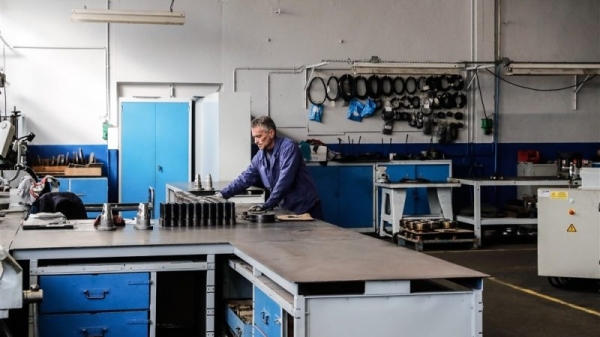Pensions reform points to France’s changing relationship to work

French people’s relationship to work is changing. While the government pushes for longer working lives, burnout rates are high. Opposing voices look to the four-day workweek as an alternative.
The pensions reform, which is due to see the minimum legal retirement age go up from 62 to 64, has triggered backlash across the country. According to its fiercest critics, the bill would leave blue-collar workers who are close to retirement worse off than before.

Four-day work week: How competitive is mental health?
The Brussels economic policy crowd seems to be positively inclined towards the idea of a four day work week if a recent debate at the Brussels Economic Forum is anything to go by.
Changing attitudes to work
This “mother of all reforms”, as the government dubbed the plan when it was first introduced in January, is putting France’s relationship to work in the spotlight.
The proportion of French workers that considered work to be “very important” now sits at 24%, down from 60% in 1990, according to a Jean Jaures Foundation report.
“Work no longer occupies a structural place in French people’s lives,” the author of the report, Romain Bendavid, wrote. The importance of leisure, on the other hand, increased from 31% to 41% in 30 years.
COVID-19 changed how people view work, EU lawmaker Pierre Larrouturou told EURACTIV. “This is not the end of work; rather, we must look at ways to get personal time back,” he said.
Meanwhile, work-related burnout is rocketing in France. According to a specialised HR consultancy, 480,000 workers experienced “psychological distress” at work in 2022. Another consultancy, Technologia, found in January that up to 3.2 million workers face a burnout risk – over 12% of France’s labour force.
A group of senators, whose turn it is to review the bill, filed an amendment on Friday (3 March) to better recognise work-related burnout. “Rates are constantly increasing,” the amendment reads.

Controversial pension reform ‘not negotiable’, says French PM
Despite growing criticism against a bill that would raise the retirement age from 62 to 64, the government is holding its ground as the country prepares for a hectic week ahead of the strike on Tuesday.
A day before the French …
35-hour week
In 2000, France passed a politically-explosive-turned-iconic bill to bring maximum weekly working hours down from 39 to 35.
As for France’s unemployment rate, it hovered at approximately 8.5% between 2000 and 2006, decreasing to 6.9% before the 2008 recession. EU 27 countries as a whole fluctuated between 9.5% and 10% approximately across the same period.
Nevertheless, in the late 1990s, the French labour force was one of the most productive among all OECD countries, parallel with Germany. GDP per hour worked stood at $55.70 in France in 1999, against an EU average of $42.80.
Since the introduction of the 35-hour week, France’s productivity levels have continued to increase, reaching $68 in 2020 – again, on par with Germany. The EU average stands at $55.

Finland puts four-day work week back on political agenda
Promising results from a four-day work week trial in the UK revived the debate in Finland ahead of the April elections.
In the UK pilot promoted by 4 Day Week Global, nearly 3000 employees in 61 companies trialed a 32-hour working …
Toying with weekly working hours
In 2007, France made remuneration for overtime work exempt from income tax. Through a 2019 legislative change, €7,500 worth of overtime was virtually tax-free.
In practice, in April 2022, the average French person worked a 38.8-hour week, according to Health Ministry data, though the figure is markedly higher – 47.7 hours – for the self-employed.
As the government scrambles to level the €17.7 billion pensions deficit, the question of working hours is coming back to the fore.
“Adding 30 mins to weekly working hours would bring €5.7 billion back to the state,” centrist MP Philippe Vigier told EURACTIV, adding that he had intended to table an amendment to raise the hour ceiling from 35 to 35.5 hours in public debates over the bill in February – but withdrew it, fearing political backlash.
The other side of the aisle is very much against the proposal.
“Doing away with the 35-hour bill will have people work harder, but in poorer health”, far-left MP Hadrien Clouet told EURACTIV. “If the government wants higher social contributions from workers to close the deficit, then we might as well increase wages,” he said.
Such is one of the main arguments of those protesting the pensions reform: that the age increase will primarily hit those struggling most, and as a result, their health will be compromised.
As for the government, it’s remained quiet. The 35-hour status quo with untaxed overtime “strikes a good balance”, Labour Minister Olivier Dussopt said in February.

Belgium permits four-day week, right to disconnect
Belgian employees will be able to work a four-day week after the government on Tuesday (15 February) agreed a new labour accord aimed at bringing flexibility to an otherwise rigid labour market.
Four-day week
“Pushing back the legal retirement age doesn’t make any sense”, Larrouturou said. The MEP highlighted the four-day week as a solution, a policy he’s consistently backed throughout his political career.
A 4-day, 32-hour work week could create up to 1.6 million jobs in France if all companies adopted it, according to the EU lawmaker’s estimates – though actual data is scarce. “This means 1.6 million more people contributing towards the pensions system,” he said.
He contributed to the drafting of a short-lived 1995 bill – eventually outvoted in 1998 – which gave companies economic incentives if they adopted a four-day work week and increased employment rate by at least 10%. Approximately 300 companies benefited from the incentives: “a genuine success” which he wants to see generalised.
Initial studies across Europe suggest the four-day week may be a success. A UK trial between June and December 2022, which included 61 companies and 2,900 workers, found that 71% of workers had reduced levels of burnout by December, while 39% felt less stressed. At the same time, company revenue went up 35% compared to similar time periods in previous years. Staff resignation fell 5.7% over the trial period.
There’s no country-wide intention to shift to the four-day week model for the moment, however. “Work is a cultural taboo” in France, Larrouturou told EURACTIV, but he hopes the pensions reform might mark the start of a new beginning.

Subscribe to The Economy Brief
Subscribe to EURACTIV’s Economy Brief, where you’ll find the latest roundup of news about the European economy and about a variety of policy issues from workers’ rights over trade agreements to financial regulation.
Brought to you by János Allenbach-Ammann (@JanosAllAmm). …



